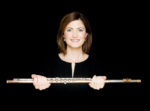Social justice liberals continue to shoot themselves in the foot while imposing their utopian mandates on the American people.
 The latest victim is the nation’s oldest orchestra organization, the Boston Symphony Orchestra.
The latest victim is the nation’s oldest orchestra organization, the Boston Symphony Orchestra.
Boston Symphony Orchestra principal flutist Elizabeth Rowe has filed a lawsuit against the orchestra, claiming that she is making substantially less each year than her closest peer — a man.
Rowe’s suit was filed in Massachusetts’ Suffolk County Superior Court on Monday morning, the day after a new, statewide equal pay law went into effect. Her suit may be the first gender pay equity claim filed under the Massachusetts Equal Pay Law (MEPA). She is asking for more than $200,000 in unpaid wages from the orchestra.
Rowe’s lawyer, Elizabeth A. Rodgers, says that her client has met repeatedly this year with the BSO administration in hopes of resolving the matter, including providing them with documentation of MEPA. The statute passed in 2016 but did not take effect until this past Sunday, specifically so that companies had ample time to audit and remedy salary and wage gaps.
— NPR, 7/5/18
A little background with my perspective is in order.
After a couple of summers working as a stage crewman for the Berkshire Music Center at Tanglewood, summer home of the Boston Symphony Orchestra, I was hired by the BSO in 1977 as a Press Office Assistant and in-house Graphic Designer. During downtime that coincided with auditions, I would sit in the darkened second-level back row and watch dozens of talented musicians from around the country show off their ability, most of the time, for one open seat.
 Rowe’s complaint, filed in Suffolk County Superior Court on Monday, one day after the law went into effect, alleges that since she was hired in 2004, the BSO “has discriminated against Rowe on the basis of gender by paying her an amount less than other comparable males.”
Rowe’s complaint, filed in Suffolk County Superior Court on Monday, one day after the law went into effect, alleges that since she was hired in 2004, the BSO “has discriminated against Rowe on the basis of gender by paying her an amount less than other comparable males.”
Rowe, who won a highly competitive audition to earn her coveted post at the BSO, is seeking more than $200,000 in unpaid wages.
— Boston Globe, 7/6/18
“Other comparable males”…? How could she conclude that?
I mentioned my experience watching numerous auditions at Symphony Hall because, at least back in 1977-79, auditions were only between those evaluating and the person auditioning. It wasn’t like all of those who sought an opening were standing side-by-side, freestyling, and being able to clearly see who comparibly was better than the other.
And yes, skills do diminish over the years in any profession. Elizabeth Rowe’s time will come and seeing how the lead violinist (“concertmaster”) is normally be the highest paid, one would think she should be damned grateful to be the top paid principal female as a flutist.
I say this because when Ms. Rowe claims she was offered less money than her “comparable” male counterpart.
Rowe says that she is currently the top-paid female principal player in the BSO, while the BSO’s principal oboist, John Ferrillo, is the symphony’s top-paid male principal musician. According to the BSO’s 2016 IRS Form 990, Ferrillo was paid $286,621, the largest salary paid to any BSO principal musician.
 John Ferrillo was hired by the BSO in 2004 at the same time Rowe was. If you observe supply and demand, finding and keeping a good oboist could give that person better bargaining power than a flutist, of which there probably a lot more to choose from. Just sayin’.
John Ferrillo was hired by the BSO in 2004 at the same time Rowe was. If you observe supply and demand, finding and keeping a good oboist could give that person better bargaining power than a flutist, of which there probably a lot more to choose from. Just sayin’.
(Violinist Malcolm Lowe — the orchestra’s concertmaster, who serves as something of a liaison between the symphony’s musicians and its conductor — earned $415,402 in 2016.) The BSO’s three other highest-paid musicians — its principal trumpet, principal viola and timpanist — are all male.
— NPR, 7/5/18
Like the affirmative action argument, if blacks aren’t hired for certain jobs, was it really racism or the amount of blacks who applied for that job. During my time at the Berkshire Music Center where students got expert tutelage from BSO musicians, I can’t remember seeing many female trumpet players or percussionists and that’s always explained the current gender disparity in those positions.
I guess we can no longer say a male at the Boston Symphony might be better and/or more senior than a female.
 As playing for the Boston Symphony Orchestra and its subsidiaries has always been a great honor for a classical musician, it’s not like the BSO is only place Elizabeth Rowe could’ve worked. Some people looking for to work for a particular company do some research and have a rough idea of how much said position earns before they walk into an interview. If you don’t like what that employer is offering, you go somewhere else. Elizabeth Rowe accepted the amount offered. Maybe she negotiated up, but if she had an issue with compensation, she should have said something during the hiring process; not sue a day after an equal pay goes into effect.
As playing for the Boston Symphony Orchestra and its subsidiaries has always been a great honor for a classical musician, it’s not like the BSO is only place Elizabeth Rowe could’ve worked. Some people looking for to work for a particular company do some research and have a rough idea of how much said position earns before they walk into an interview. If you don’t like what that employer is offering, you go somewhere else. Elizabeth Rowe accepted the amount offered. Maybe she negotiated up, but if she had an issue with compensation, she should have said something during the hiring process; not sue a day after an equal pay goes into effect.
What are the possible ramifications of Rowe’s suit?
Females who audition for the Boston Symphony Orchestra, a nonprofit that probably meets that liberal stereotype, will now have to be really good where they maybe didn’t have to be because it was all about hiring women. Males may not be tasked with doing as much because it will now be all about “equality” and them not earning more than women for equal work.
Back in the day, people’s wages were a personal thing and not for public consumption outside of the high-priced world of sports and entertainment. Now, there will be personal evaluation and scrutiny of the wages of the artists, not just within the BSO but all entities with the Commonwealth of Massachusetts and if you don’t think there will be wage-envy, scrambling to pay women and minorities hire wages regardless of their performance, you just wait.

